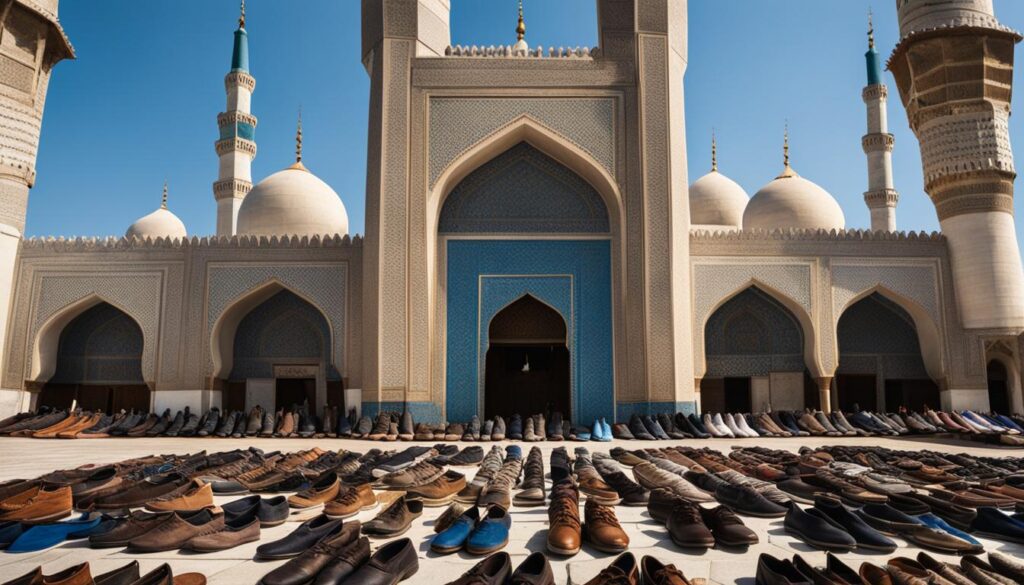The Friday prayer, also known as Jumuʿah, is a special prayer that Muslims attend in the afternoon. It is considered to be the holiest day of the week in Islam. The duration of the Friday prayer can vary, but typically the sermons last between 30-45 minutes, followed by a short prayer that lasts 5-10 minutes.
Key Takeaways:
- The Friday prayer, also known as Jumuʿah, is a significant prayer in Islam.
- It is held in the afternoon and typically lasts between 30-45 minutes.
- After the sermon, there is a short prayer that lasts 5-10 minutes.
- The Friday prayer is considered an obligatory act of worship for Muslim males.
- Non-Muslims are welcome to attend the Friday prayer.
What is Jumuʿah?
Jumuʿah, meaning “day of congregation” in Arabic, is a special prayer that Muslims gather for on Fridays. It is an obligatory act of worship commanded by God in the Qur’ān. Jumuʿah holds great significance in Islam and is considered the holiest day of the week.
The purpose of Jumuʿah is to bring together the Muslim community for collective prayer and spiritual guidance. It is a time when Muslims are encouraged to hasten earnestly to the remembrance of Allah and leave off business. During Jumuʿah, special sermons are delivered by imams, addressing various topics such as spirituality, current events, social issues, and family. These sermons serve as reminders and sources of guidance for the Muslim community.
“The best day on which the sun has risen is Friday. On it, Adam was created, on it he was admitted to paradise, and on it, he was expelled from it. The hour of prayer on Friday is the best of all hours.” – Prophet Muhammad (Peace Be Upon Him)
Jumuʿah is not just a prayer, but a significant gathering that strengthens the bonds between Muslims and fosters a sense of unity, brotherhood, and community. Muslims are encouraged to observe Jumuʿah by attending the prayer, listening to the sermon, and reflecting on its teachings.
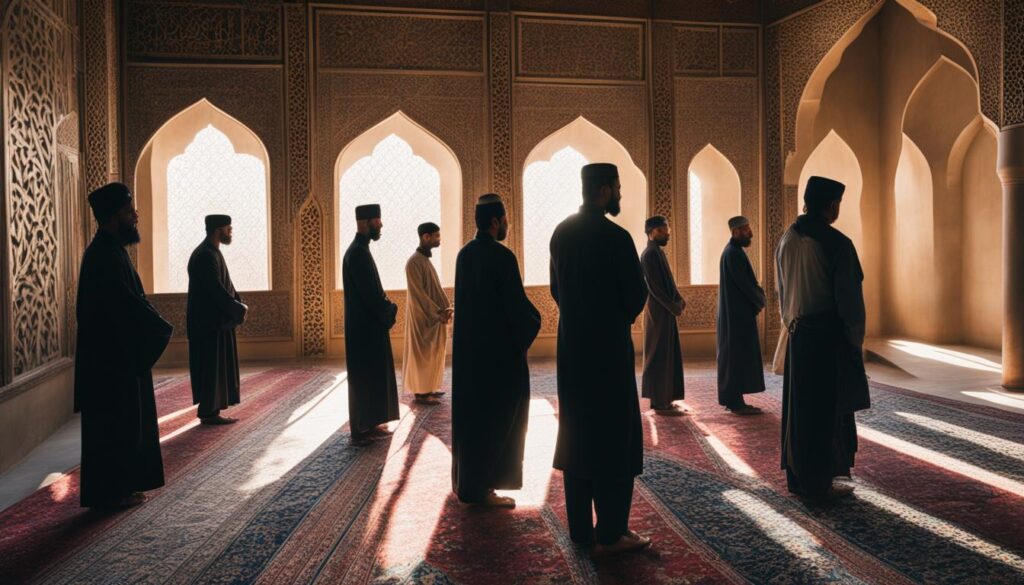
Table: Comparing Jumuʿah and Daily Prayers
| Jumuʿah | Daily Prayers | |
|---|---|---|
| Frequency | Once a week | Five times a day |
| Mandatory | For adult Muslim males | For all Muslims |
| Duration | 30-45 minutes (including sermon) | 5-10 minutes |
| Imam’s Role | Delivers sermon and leads the prayer | Leads the prayer |
The Significance of Friday
In Islam, Friday holds great significance as it is considered the holiest day of the week. The importance of Friday can be traced back to religious teachings and historical events. According to Islamic belief, it is believed that Adam, the first man, was created and admitted to paradise on a Friday. Additionally, it is believed that the day of judgment will occur on a Friday. These beliefs contribute to the reverence and sanctity associated with Fridays in the Islamic faith.
Furthermore, Friday is seen as a day of expiation for sins. Muslims are encouraged to take a shower on Friday mornings and wear their best clothes, symbolizing purity and devotion. The period between one Friday prayer and the next is seen as an opportunity for spiritual growth and repentance. Observing the Friday prayer is considered a means of seeking forgiveness and attaining blessings from Allah.
Moreover, the congregational nature of the Friday prayer fosters a strong sense of community among Muslims. It is a time for believers to come together, listen to the sermon delivered by the imam, and engage in collective worship. The Friday prayer serves as a reminder of the principles and teachings of Islam, offering guidance and inspiration to the Muslim community.
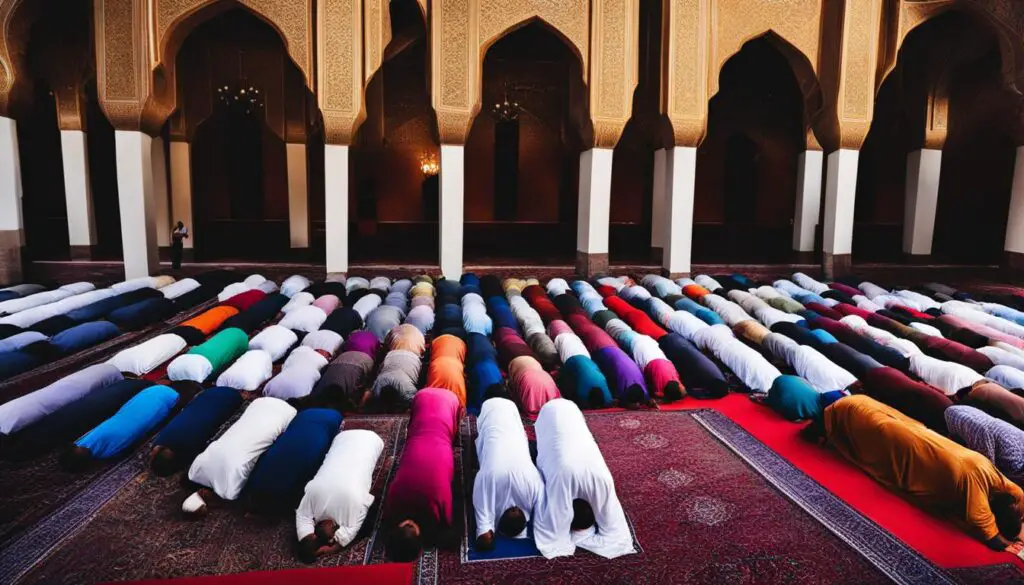
The Significance of Friday in Islam:
- Believed to be the day of Adam’s creation and admission to paradise
- Associated with the day of judgment
- Considered a time of expiation for sins
- Encouraged to take a shower and wear special clothes on Fridays
- Opportunity for spiritual growth and repentance
- Strengthening of community bonds through congregational worship
How is The Friday Prayer Performed?
The Friday prayer, also known as Jumuʿah, is a congregational prayer that holds great significance in Islam. The prayer is performed in a specific order, consisting of a sermon followed by two prayer cycles. Here is a step-by-step breakdown of how the Friday prayer is performed:
- The prayer begins with the adhan, the call to prayer, which is announced by the mu’adhin (the person who calls the adhan). The adhan is a melodious recitation that signals the start of the prayer.
- After the adhan, the imam (the prayer leader) delivers the sermon, also known as the khutbah. The khutbah usually consists of two parts, with a short pause in between. The imam addresses the congregation, providing guidance, teachings, and reminders.
- Following the sermon, the imam leads the congregation in the performance of the Friday prayer. The prayer consists of two cycles, similar to the regular daily prayers, but with some slight differences in the recitations.
- Once the prayer is complete, the congregation offers supplications and makes individual prayers. It is a time for personal reflection and seeking forgiveness from Allah.
The Friday prayer is a collective act of worship, and unity is emphasized during its performance. It is essential for the congregation to follow the imam’s lead and maintain silence during the sermon.
“The Friday prayer is a sacred time for Muslims to come together, listen to the sermon, and strengthen their relationship with Allah. It is an opportunity for spiritual growth and reflection.”
Overall, the Friday prayer is a significant observance within the Islamic faith. It serves as a means for Muslims to connect with Allah, seek guidance, and gather as a community to worship together.
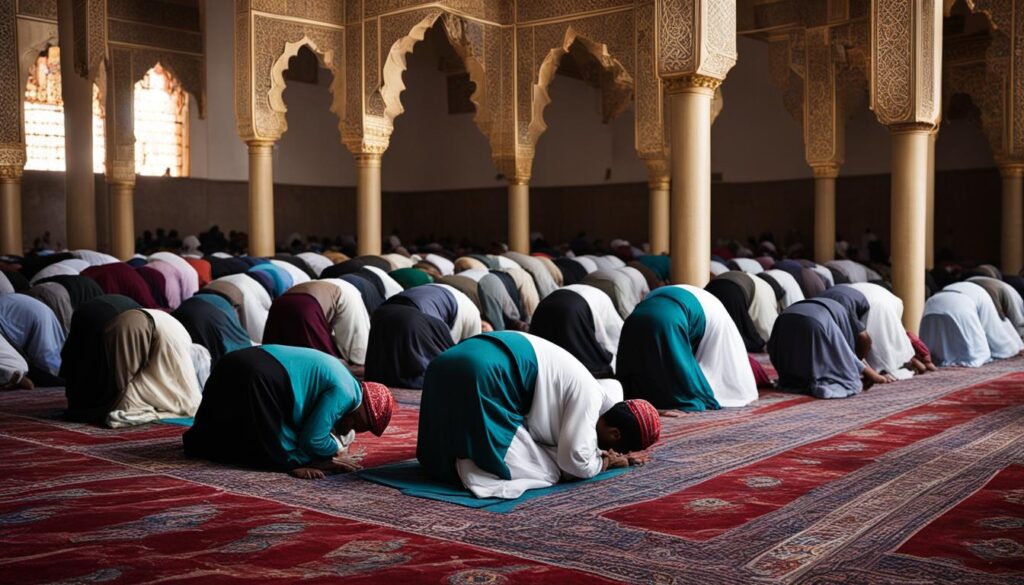
The Friday prayer, also known as Jumuʿah, is a significant religious gathering for Muslims. It is important to understand the timing of the Friday prayer to ensure that one can participate and fulfill their religious obligations. The exact timing of the Friday prayer may vary depending on the mosque and the region, but it typically takes place in the afternoon, replacing the regular afternoon prayer.
In most mosques, the Friday prayer is held between 12:00 PM and 3:00 PM. This time range allows Muslims to attend the prayer during their lunch break or after completing their morning activities. It is advisable to check with the local mosque or Islamic center for the specific prayer time, as it may differ based on the local prayer schedule and the time of year.
The Friday prayer holds great significance in the lives of Muslims, and attending it is considered a religious duty. By observing the designated timing for the Friday prayer, Muslims can join their fellow believers in worship and benefit from the spiritual and communal atmosphere of the gathering.
Do Muslim Students and Employees Need Special Accommodations on Fridays?
For Muslim students and employees, attending the Friday prayer, also known as Jumuʿah, can sometimes create scheduling conflicts with work or school. Since the Friday prayer takes place during the afternoon, special accommodations may be necessary to allow individuals to fulfill their religious obligations. Some workplaces and universities with a significant Muslim population have recognized the importance of accommodating the Friday prayer and have implemented measures to facilitate its observance.
In many cases, employers and educational institutions allow their Muslim employees or students to organize their own prayer services on-site. By designating a prayer space and allowing scheduled breaks during the Friday prayer time, individuals are able to attend and participate in the religious gathering without interfering with their work or studies. These accommodations not only demonstrate respect for religious diversity but also contribute to a more inclusive and harmonious environment.
Quote: “Offering accommodation for the Friday prayer shows an organization’s commitment to religious diversity and inclusion.” – John Smith, Human Resources Manager
It’s worth noting that accommodations for the Friday prayer can take various forms depending on the specific needs of the individuals and the dynamics of the workplace or educational institution. Some employers may allow flexible work hours on Fridays to give employees the opportunity to attend the prayer, while others may offer early dismissal or extended lunch breaks. Similarly, universities may adjust class schedules to accommodate the Friday prayer, ensuring that students have the opportunity to participate.
| Benefits of Friday Prayer Accommodations | Examples of Accommodations |
|---|---|
| Enhances religious freedom and diversity | Designated prayer rooms or spaces |
| Boosts employee/student morale and loyalty | Flexible work/school hours on Fridays |
| Fosters inclusive and respectful workplace/university environment | Early dismissal or extended lunch breaks |
Overall, providing special accommodations for the Friday prayer not only enables Muslim students and employees to fulfill their religious obligations but also promotes a culture of inclusivity and respect. By acknowledging and respecting the religious practices of their Muslim community members, employers and educational institutions contribute to a more harmonious and diverse society.
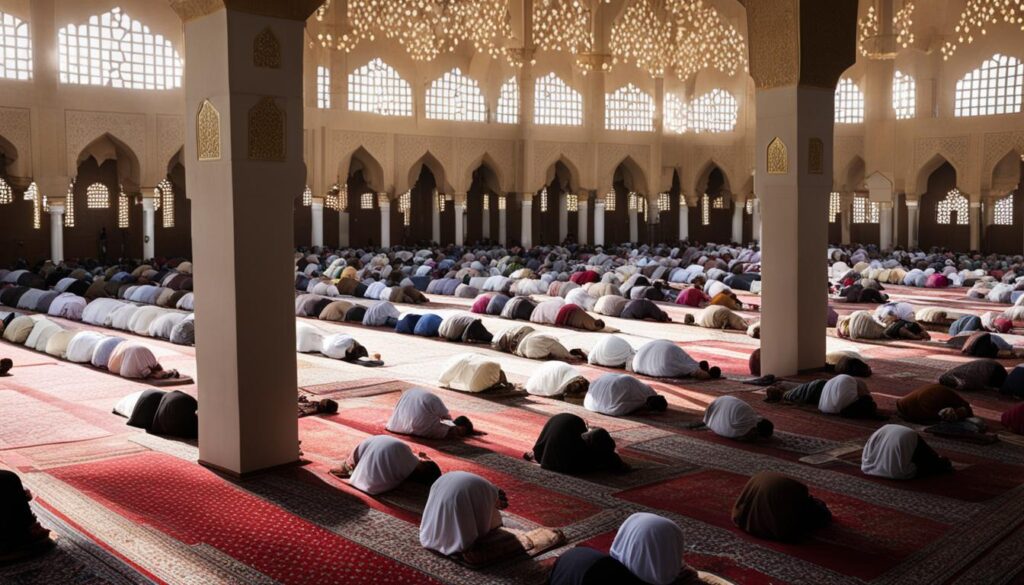
Mandatory Friday Prayer: Who is Required to Attend Jumuah Prayer?
The Friday prayer, or Jumuʿah, is an obligatory act of worship in Islam. It is considered mandatory for all Muslim males who have reached the age of puberty. While attendance is not mandatory for women and children, many still choose to participate in the Friday prayer as it holds spiritual benefits and provides an opportunity to strengthen their faith.
Women and children attending the Friday prayer are encouraged to do so in accordance with Islamic guidelines. Women are advised to cover their bodies modestly and may choose to pray in designated areas reserved for females within the mosque. Children are welcome to attend and learn from the sermons, fostering a sense of religious education and community from a young age.
Non-Muslims are also welcome to observe the Friday prayer. It offers them a chance to gain insight into Islamic worship and experience the sense of community that comes with congregational prayer. However, it’s important to note that the sermon topics during the Friday prayer are generally directed towards a Muslim audience.
Key Points:
- The Friday prayer is mandatory for Muslim males of age.
- Women and children are not obligated but often attend the Friday prayer.
- Non-Muslims are welcome to observe the Friday prayer, but sermons are usually directed towards Muslims.
“The Friday prayer is a gathering of the Muslim community, but it is primarily mandatory for Muslim males. However, women and children also participate in the prayer, and non-Muslims are welcome to attend.”
How Friday Prayer is Observed in Muslim-Majority Countries?
In many Muslim-majority countries, the Friday prayer, or Jumuʿah, holds immense significance and is an integral part of the community’s religious practice. It is observed with great devotion and reverence, bringing people together in mosques or designated prayer spaces. The Friday prayer serves as a communal gathering, strengthening the bond among Muslims and fostering a sense of unity and spirituality.
The Friday prayer in Muslim-majority countries is characterized by its large attendance, with people from all walks of life coming together to fulfill their religious duties. Mosques are filled with worshippers, and sometimes, outdoor prayer areas are set up to accommodate the overflow of attendees. The atmosphere is filled with devotion, as individuals engage in prayer, listen to the sermon, and seek spiritual guidance.
Throughout the Muslim world, the customs and practices associated with the Friday prayer vary slightly depending on local traditions and cultural norms. However, the core elements remain consistent: the sermon delivered by the imam, followed by congregational prayers. The duration of the Friday prayer may differ, but it typically lasts around 30-45 minutes, creating a space for reflection, contemplation, and supplication.
| Country | Customs and Practices |
|---|---|
| Saudi Arabia | In Saudi Arabia, the birthplace of Islam, the Friday prayer holds immense importance. The country’s cities and towns are filled with mosques, and worshippers gather to offer prayers. The Saudi government takes special measures to facilitate the smooth execution of the Friday prayer, such as implementing traffic regulations and organizing public transportation schemes to ensure widespread access to mosques. |
| Indonesia | Being the world’s most populous Muslim-majority country, Indonesia has a rich Friday prayer tradition. The local customs include a pre-prayer ritual known as “merangkai doa,” where worshippers gather in small circles to recite supplications before the sermon. The Friday sermon often addresses social and moral issues affecting Indonesian society. |
| Iran | In Iran, the Friday prayer is highly politicized, and the sermon often reflects the country’s current political climate. The prayers are held in large congregational mosques, and it is customary for the attendees to participate in chants and slogans expressing their solidarity with the Iranian leadership. |
These examples highlight the diverse ways in which the Friday prayer is observed across Muslim-majority countries. Despite the regional variations, the underlying objective remains the same – to gather as a community, seek spiritual nourishment, and strengthen the bonds of faith. The Friday prayer serves as a unifying force, reminding Muslims of their shared values and the significance of collective worship.
Friday Prayer in the United States
In the United States, Muslims gather for the Friday prayer at mosques located near their places of work or residence. The Friday prayer, also known as Jumuʿah, holds a special place in the hearts of American Muslims as they come together to worship and seek spiritual nourishment.
Many mosques in the United States allocate specific prayer times for Jumuʿah, usually falling between 12-3pm. This allows the Muslim community to gather and engage in a communal act of worship, regardless of their busy schedules. The Friday prayer serves as a reminder for Muslims to pause from their daily routines and focus on their spiritual growth and connection with Allah.
Attending the Friday prayer in the United States allows Muslims to experience a sense of unity and belonging as they come together as one community, transcending cultural and ethnic backgrounds. It provides an opportunity for individuals to connect with fellow worshippers, strengthen their faith, and receive guidance from the imam who leads the prayer and delivers the sermon.
The Role of the Imam in the Friday Prayer
In the Friday prayer, the imam plays a central role as the leader of the congregation. The imam is responsible for delivering the sermon and leading the prayer, guiding the worshippers through the spiritual experience. They hold a position of authority and are respected for their knowledge of Islamic teachings and their ability to inspire and educate the community.
The imam’s role in the Friday prayer extends beyond the physical act of leading the prayer. They are also responsible for providing guidance and counseling to the community, addressing social and moral issues, and promoting unity and understanding among the worshippers. The sermons delivered by the imam often touch upon various topics, such as spiritual reminders, current events, and personal growth, aiming to connect the teachings of Islam with the challenges and concerns of the community.
The imam’s role as a leader in the Friday prayer is not limited to the mosque but extends to the wider community. They act as a representative of the Muslim community, advocating for social justice, interfaith dialogue, and community outreach. The imam’s influence goes beyond the walls of the mosque, as they play a crucial role in fostering a sense of cohesion and belonging among Muslims.
The Responsibilities of the Imam in the Friday Prayer
- Leading the congregational prayer
- Delivering the sermon (khutbah)
- Guiding and counseling the community
- Addressing social and moral issues
- Promoting unity and understanding
- Advocating for social justice
- Engaging in interfaith dialogue
- Participating in community outreach
The imam’s role in the Friday prayer is essential in creating a space for spiritual growth, community development, and social transformation. Through their leadership, the imams guide the worshippers towards a deeper understanding of their faith and inspire them to live in accordance with its teachings.
Benefits and Rewards of Attending the Friday Prayer
Attending the Friday prayer holds numerous benefits and rewards for Muslims. It is considered a form of worship and an opportunity to strengthen one’s faith. By participating in the Friday prayer, individuals can experience spiritual growth and a deeper connection with Allah.
One of the key rewards of attending the Friday prayer is the expiation of sins. It is believed that by listening to the sermon and engaging in prayer, Muslims can seek forgiveness for their past transgressions. This act of repentance and seeking forgiveness is a crucial aspect of the Islamic faith, and the Friday prayer provides a dedicated time for individuals to engage in this process.
The Friday prayer also serves as a means of community building. Muslims come together in mosques to pray, listen to the sermon, and engage in fellowship. This communal aspect of the Friday prayer fosters a sense of belonging and unity within the Muslim community. It provides an opportunity for individuals to support and uplift one another, creating a supportive and inclusive environment.
Additionally, attending the Friday prayer allows individuals to gain knowledge and guidance from the imam. The sermon delivered during the Friday prayer covers a wide range of topics, including spiritual reminders, societal issues, and personal growth. These sermons provide valuable insights and guidance for Muslims to navigate their lives in accordance with Islamic principles. By actively participating in the Friday prayer, individuals can benefit from the wisdom and knowledge imparted by the imam.
| Benefits of Attending the Friday Prayer | Rewards of Attending Jumuah Prayer |
|---|---|
| Expiation of sins | Spiritual growth |
| Community building | Deeper connection with Allah |
| Guidance from the imam | Opportunity for repentance |
Attending the Friday prayer is a deeply significant act for Muslims. It offers not only the chance to seek forgiveness and expiation of sins but also a means to strengthen one’s faith, engage in community building, and gain valuable guidance. By prioritizing and participating in the Friday prayer, individuals can reap the immense benefits and rewards associated with this sacred act of worship.
Conclusion
In conclusion, the Friday prayer, also known as Jumuʿah, is a significant and obligatory act of worship in Islam. Muslims gather on Fridays to attend this special prayer, which is considered the holiest day of the week. The duration of the Friday prayer may vary, but it usually involves sermons lasting between 30-45 minutes, followed by a short prayer of 5-10 minutes.
Attending the Friday prayer holds several benefits and rewards in Islamic belief. It is believed that by attending the Friday prayer and listening to the sermon, Muslims have the opportunity to expiate their sins. Additionally, the Friday prayer serves as a form of worship and a means for Muslims to come together as a community and strengthen their faith.
Although the Friday prayer is mandatory for Muslim males of age, women and children also attend, even though it is not obligatory for them. Non-Muslims are also welcome to participate in the Friday prayer. In Muslim-majority countries, Friday is considered part of the weekend, and the prayer plays a significant role in the social and cultural fabric of those communities.
As the Friday prayer can sometimes conflict with work or school schedules, special accommodations may be necessary for Muslims to attend. Some workplaces and universities with a substantial Muslim population allow their employees or students to organize prayer services on-site or adjust their schedules accordingly. It is encouraged for Muslims to observe the Friday prayer and make arrangements if needed.
FAQ
How long is the Friday prayer?
The duration of the Friday prayer can vary, but typically the sermons last between 30-45 minutes, followed by a short prayer that lasts 5-10 minutes.
What is Jumuʿah?
Jumuʿah, which means “day of congregation” in Arabic, is a special prayer that Muslims gather for on Fridays. It is considered an obligatory act of worship.
What is the significance of Friday?
Friday is considered to be the holiest day of the week in Islam. It is believed that Adam was created and admitted to paradise on a Friday, and that the day of judgment will occur on a Friday.
How is the Friday prayer performed?
The Friday prayer consists of a sermon followed by two short prayer cycles. The prayer begins with a call to prayer, followed by the sermon, and ends with the prayer. The sermon is delivered by an imam, and everyone is required to listen to the imam without talking.
What time is the Friday prayer?
The exact timing of the Friday prayer may vary depending on the mosque, but it usually falls between 12-3pm. Many mosques in the West have fixed times for the Friday prayer.
Do Muslim students and employees need special accommodations on Fridays?
The Friday prayer can sometimes conflict with work or school schedules. Special accommodations may be needed for Muslims to attend the Friday prayer, such as adjusting work or class schedules.
Are all Muslims required to attend the prayer?
The Friday prayer is mandatory for all Muslim males who are of age. However, many women and children also attend the prayer, even though it is not mandatory for them. Non-Muslims are welcome to attend the Friday prayer.
How is the Friday prayer observed in Muslim-majority countries?
In many Muslim-majority countries, Friday is considered part of the weekend, and the Friday prayer is a significant part of the community’s religious practice. Communities may gather in mosques or other designated prayer spaces for the Friday prayer.
How is the Friday prayer observed in the United States?
In the United States, Muslims gather for the Friday prayer at mosques located near their places of work or residence. Some mosques have specific prayer times for Jumuʿah, usually falling between 12-3pm. American mosques bring together a diverse range of Muslims as one community.
What is the role of the imam in the Friday prayer?
The imam plays a central role in leading the Friday prayer. They deliver the sermon and lead the congregation in prayer. The topics of the sermons can vary, covering spiritual reminders, societal issues, and personal growth.
What are the benefits and rewards of attending the Friday prayer?
Attending the Friday prayer is believed to lead to the expiation of sins. It is also considered a form of worship and an opportunity for Muslims to come together as a community and strengthen their faith.



